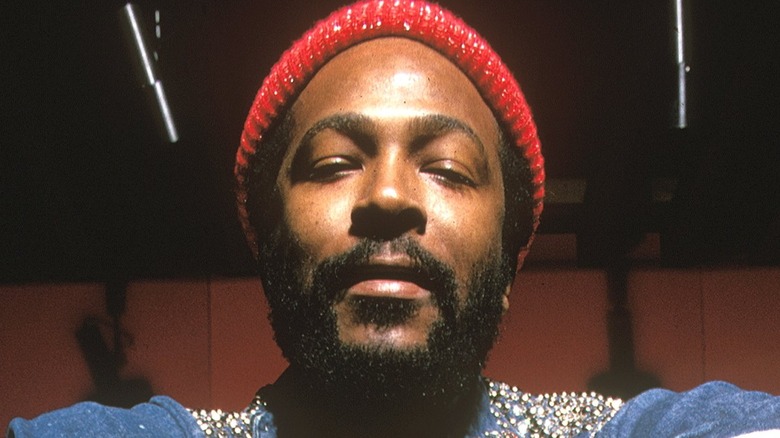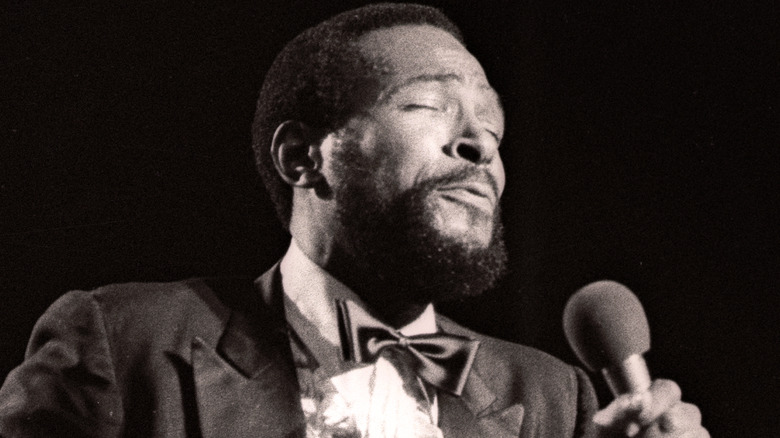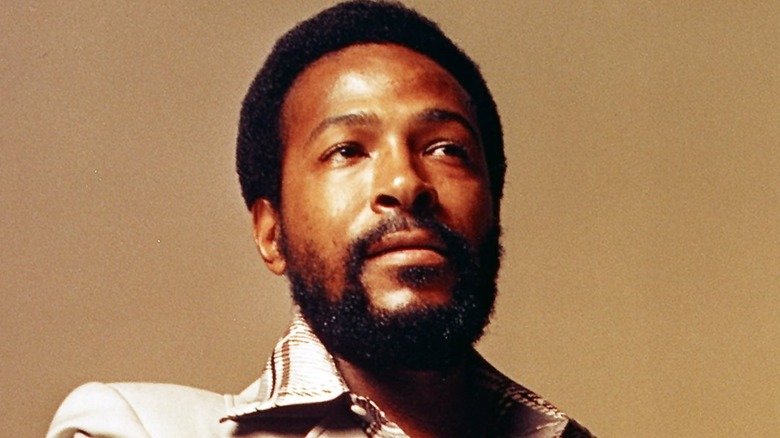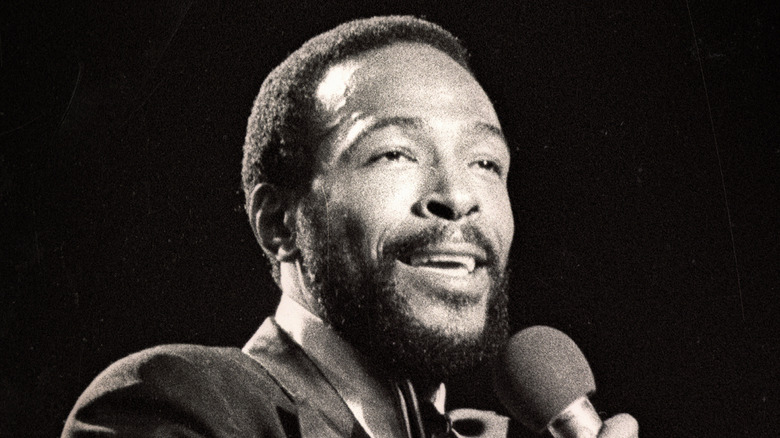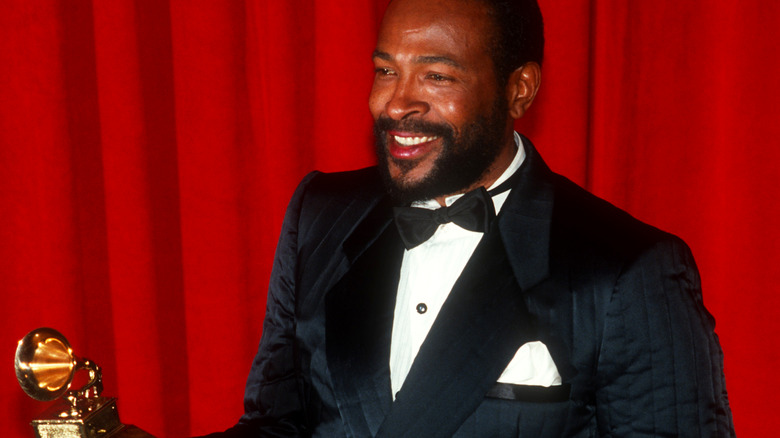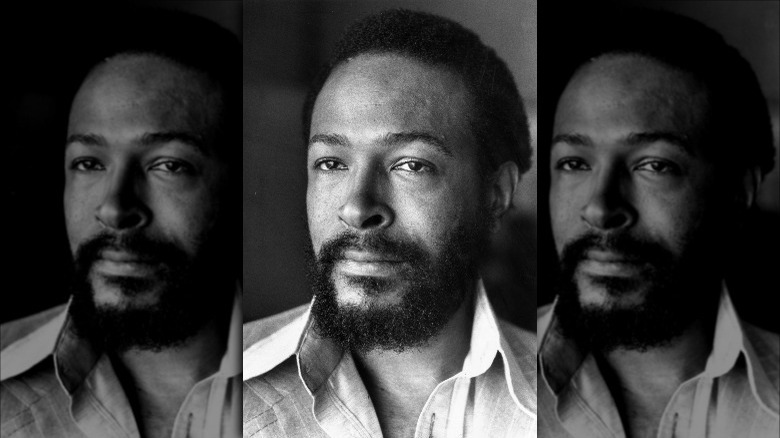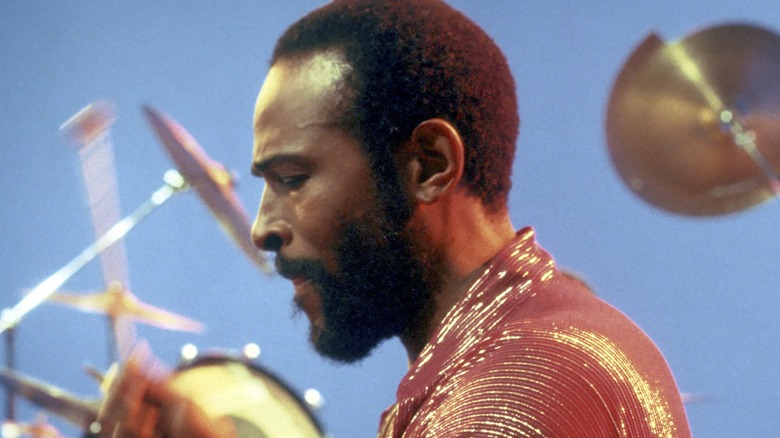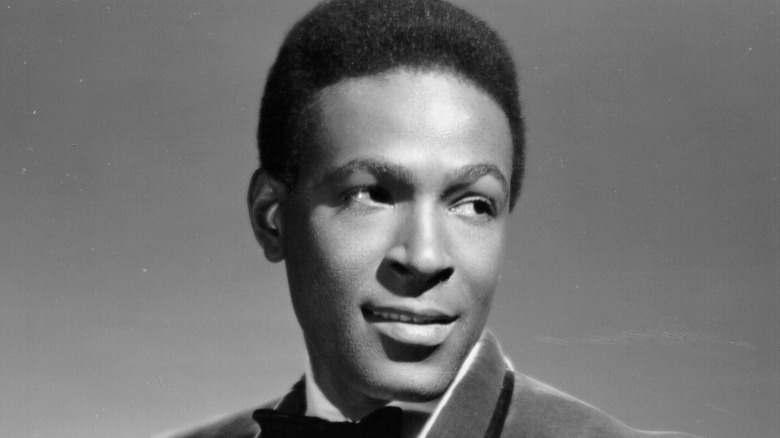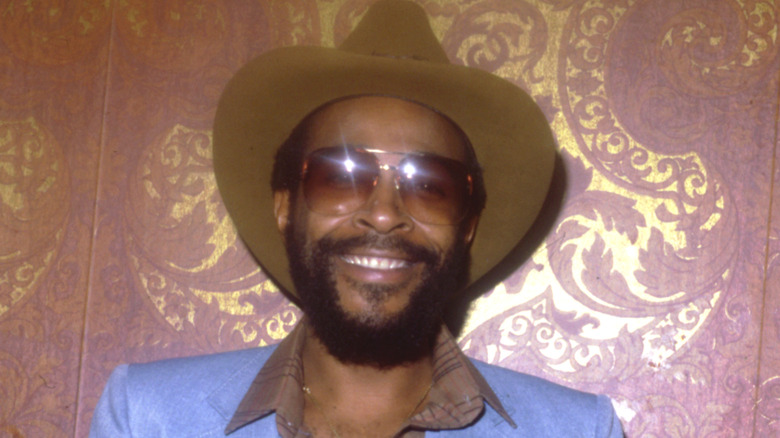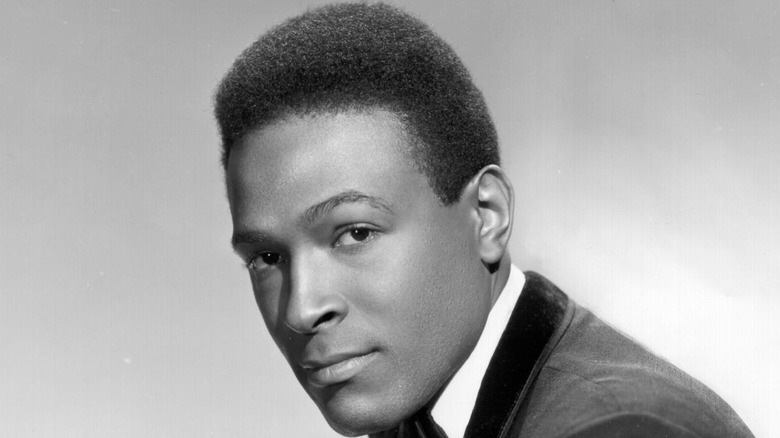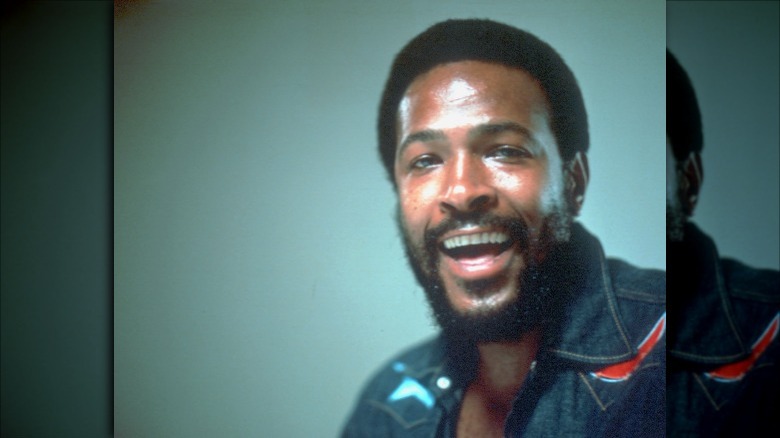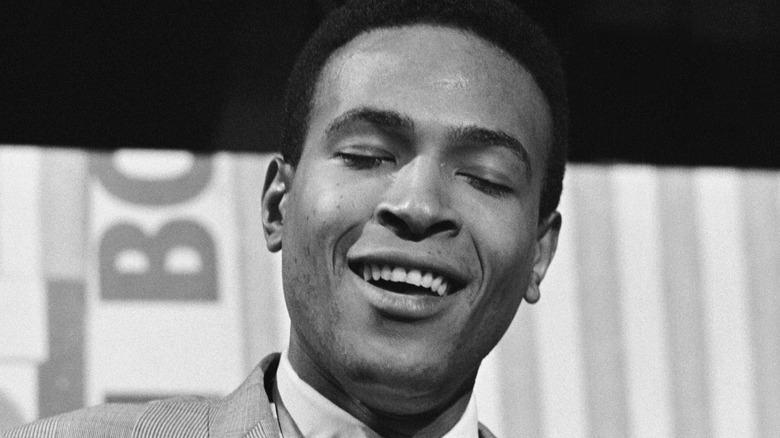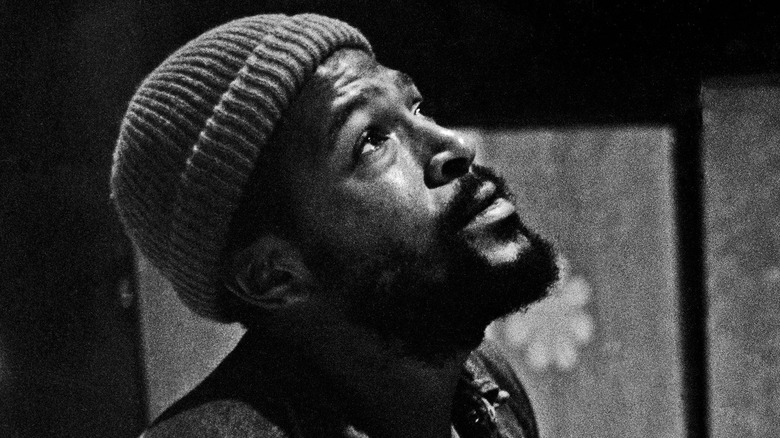What Marvin Gaye's Final Year Was Really Like
This article contains mentions of mental health issues, drug addiction, child abuse, attempted suicide, and murder.
Marvin Gaye could be called the perfect artist if someone really wanted to break it down. Not only was he a gifted pianist and drummer, but he also possessed an angelic voice that wooed the women and made the fellas want to be just like him. Plus, Gaye was able to satisfy the executives at his longtime record label, Motown, by churning out a bunch of hits, from "I Heard It Through the Grapevine" to "What's Going On" to "Sexual Healing." However, he also made sure to address some of the world's problems in his writing, proving that he wasn't just motivated by dollars and chart positions.
Some of those things are mentioned whenever people talk about his tragic death, because on April 1, 1984 — just one day before his 45th birthday — Gaye's father, Marvin Gay Sr., shot and killed him in Los Angeles, California in the same house that Gaye previously signed over to his parents. Those old enough can probably remember where they were when they heard the news that the legendary musician was shot, and those not born yet or too young to remember have most likely become familiar with the incident via television and news articles.
But before that deadly father-son argument, and before Gay Sr. took away one of the world's most beloved singers, what did Marvin Gaye experience in the final year of his life? Let's just say that those last 12 months were far from uneventful.
Marvin Gaye's performance at Motown 25 had people buzzing
When Michael Jackson introduced the moonwalk to millions on the TV special, "Motown 25: Yesterday, Today, and Forever," on May 16, 1983, it seemed like the very next day, everyone was standing on their tippy-toes, then pushing down to their heel to slide backward, just like the gloved one did. But there was another iconic singer who kept a lot of people buzzing as they moonwalked, since many were also talking about Gaye's touching performance in the now-classic televised event.
In a white blazer and tan slacks, Gaye first gave a music history lesson, as he named some of the great artists of yesteryear while tickling the piano keys. He then launched into his beloved single, "What's Going On" — and although that wouldn't be his final performance before his untimely death, it could be considered a farewell of sorts, since it seemed people continued to discuss it right up until he was killed. Some might say that between Gaye's talking intro in the performance and singing "What's Going On," he not only showed his keen musicianship, but perhaps a glimpse into his emotional state, as his words seemed to have a touch of sadness to them.
Either way, Gaye's "Motown 25" performance has gone down in TV history and is closely associated with the final stages of his life.
He found commercial success after being off the charts for years
It's hard for a famous musician to have hits and maintain popularity in different decades, but Marvin Gaye managed to do it. Along the way, however, as technology advanced and new ideas were birthed by younger artists, the sound of R&B changed — and people weren't buying his albums as they once did. In fact, Gaye didn't have a solo song on the Billboard charts between 1977's "Got To Give It Up (Pt. 1)" and "Sexual Healing" in 1983.
But thankfully for the music icon, the latter single would be a sign that he was returning to his former level of prominence while winning over a younger audience. Plus, "Sexual Healing" could be considered a sequel to Gaye's 1973 cut, "Let's Get It On," which also did well on the charts and explored the same subject matter. "Sexual Healing," which is off of Gaye's 17th (and final) LP, "Midnight Love," was written by the singer, as well as Odell Brown, and it was Gaye's first hit on Columbia after leaving Motown following 20 years.
The song also earned Gaye two Grammy Awards in 1983, after he went through years of personal challenges, including two divorces and a mountain of financial problems.
The musician gave a historic performance at the NBA All-Star Game
After Marvin Gaye performed at the 33rd annual NBA All-Star Game on February 13, 1983, people were buzzing about it that entire year, the year after, and it's still being talked about today. It all went down at The Forum in Inglewood, California, and Gaye's breathtaking performance was the perfect addition to his already successful year, as his song, "Sexual Healing," was a hit and the record "Midnight Love," which houses the single, was getting a lot of attention.
So, let's set the stage (or the court, rather), because that's where the R&B legend made history with his soulful rendition of the U.S. National Anthem. Looking cool enough to provide the audience with air-conditioning by just staring at them, Gaye rocked a blue suit with dark aviator sunglasses, and delivered his signature smooth vocals over a rolling drumbeat. And here's the thing: Somehow, he was able to perfectly marry the melodies of the original composition with his own, making "The Star-Spangled Banner" recognizable enough for those who were used to the original, but changing it enough to satisfy those who wanted a more modern version. Perhaps the highlight of the performance was Gaye crooning his way through the song's final words, which made the crowd erupt with cheers.
The NBA itself, per Time, dubbed Gaye's performance as a "seminal moment in sports history."
Inside Marvin Gaye's Grammy success
When Marvin Gaye won the Grammy Award for best R&B male vocal on February 23,1983 for "Sexual Healing" at Los Angeles' Shrine Auditorium, what it took the artist to finally win wasn't lost on him. "I've waited a very long time, 20-something years to win an award such as this," he said in his acceptance speech.
For Gaye, the Grammy must have been a sign that things were finally going his way. As previously mentioned, he'd recently gone through a brutal divorce with his ex-wife, Anna Gordy, per Rolling Stone, which put him in a bad financial hole.
Gaye also performed "Sexual Healing" at the ceremony, quickly turning the Shrine Auditorium into a romantic setting. And in a clip played before Gaye performed (and later won his two trophies), he talked about the many times he'd lost to singer Lou Rawls, while also relaying an idea he once had to nab Rawls' award. "I've sat at the Grammys so many years now, hoping I'd win an award, and Lou Rawls has won them all from me," said Gaye. "I don't think I'm bitter about that, but the very last time he won one from me, he gave me such a smile, I got chills." He added with a smile, "I told my wife I was going to tackle him when he came off the stage and grab it and cause a big stink at the Grammys. But she didn't think that was too wise of an idea, so I didn't. "
He struggled with depression and drug addiction
Marvin Gaye opened up about feeling depressed more than once, and he reportedly struggled with paranoia, as well, according to The New York Times. In order to cope, he would use cocaine — and by the mid-1970s, the musician was stuck in a deep hole of addiction. After suffering heavy financial loss, the "Mercy Mercy Me" crooner also lost his homes, and he often spoke of suicide.
As his second wife, Janis Hunter, wrote in her 2015 book, "After the Dance: My Life with Marvin Gaye," the singer also reportedly freebased cocaine — and she often got a front-row seat to his dangerous mood swings. There was one alleged incident in particular that Hunter talked about with the Rhode Island Monthly that same year, in which she said her famous ex became "enraged" at her after ingesting cocaine, as well as psychedelic mushrooms, while also accusing her of betraying him in some way. "He self-medicated, and that did not take his pain [away], and I followed suit. I was in pain too," Hunter said. "... It was free love, sex, drugs, a lot of bad decision-making."
If you or anyone you know is having suicidal thoughts, please call the National Suicide Prevention Lifeline at 1-800-273-TALK (8255).
If you or someone you know is struggling with mental health, please contact the Crisis Text Line by texting HOME to 741741, call the National Alliance on Mental Illness helpline at 1-800-950-NAMI (6264), or visit the National Institute of Mental Health website.
If you or anyone you know is struggling with addiction issues, help is available. Visit the Substance Abuse and Mental Health Services Administration website or contact SAMHSA's National Helpline at 1-800-662-HELP (4357).
The Sexual Healing Tour didn't go all that smoothly for Marvin Gaye
Despite Marvin Gaye allegedly having a severe drug problem by the time 1983 rolled around, he still went on tour that year, because his "Midnight Love" album was doing so well, as was his "Sexual Healing" single. Most likely to keep the momentum going, on April 18th of that year, "The Sexual Healing Tour" began in San Diego, California — but Gaye unfortunately brought his problems on the road with him.
"There was more coke on that tour than on any tour in the history of entertainment," claimed a witness, according to The Palms Weekend. Gaye's struggles with paranoia, insecurity, stage fright, and exhaustion also reportedly added difficulty to the tour: Namely, Gaye thought that a hitman was trying to kill him, so he hired bodyguards and had people stand guard outside his hotel room (but this wasn't the first time he took such safety measures). The gifted musician also believed someone poisoned him during the tour, so he hired attorney F. Lee Bailey to investigate the person responsible, as well as the reason, per Ebony. But Gaye later claimed that activist and comedian Dick Gregory got rid of the poison by creating some sort of vaccine. To cover his bases even further, Gaye wore a bulletproof vest during the tour and only took it off on stage while singing.
"The Sexual Healing Tour" eventually wrapped up on August 14, 1983, and it would be the singer's last.
Marvin Gaye moved back in with his parents
It appears that Marvin Gaye's decision to move back in with his parents after his tour wrapped in August 1983 was attached to multiple reasons: his finances had seen better days, he was still addicted to drugs and needed help, and lastly, his mother, Alberta Gay, became ill, and he wanted to look after her. "When the tour was over, I never saw Marvin in such bad shape," she later told Ebony. "He was exhausted. He should have checked into a hospital."
The house was the same one the singer bought for his parents a decade earlier, according to the Independent, and he took a room on the upstairs level between his parents' room. But instead of attempting to kick his drug habit, it's said that Gaye — who grew up in an abusive household, once referring to his father, Marvin Gay Sr., as "like living with ... a very peculiar, changeable, cruel and all-powerful king" (via The Sydney Morning Herald) — remained holed up in his bedroom doing cocaine, while his dad downed bottles of vodka in his.
Even though there were reported tensions between Gaye and his father before the musician moved in, some neighbors were shocked by Gaye's death, because they didn't hear or see anything that seemed off. "They were very nice people and good neighbors," Audrey Addison told the Los Angeles Times. "I have never heard any commotion there."
If you or someone you know may be the victim of child abuse, please contact the Childhelp National Child Abuse Hotline at 1-800-4-A-Child (1-800-422-4453) or contact their live chat services.
If you or anyone you know is struggling with addiction issues, help is available. Visit the Substance Abuse and Mental Health Services Administration website or contact SAMHSA's National Helpline at 1-800-662-HELP (4357).
He was nominated for a Grammy for Midnight Love
During the last year of Marvin Gaye's life, there was a lot of talk about his "Midnight Love" album, which was further recognized by the Grammy committee in 1984, as the LP brought him a nomination for best male R&B vocal performance. Losing out Michael Jackson's "Billie Jean," it marked Gaye's final Grammy nod before his death.
Recorded in Belgium while Gaye was there living in tax exile, it was clear that "Midnight Love" was made with the intention of being a hit as opposed to it being an album made for art's sake. That's mainly because it incorporates sounds of the era, like drum machines. In fact, Gordon Banks, who produced the record with Gaye, said it took the singer a while to learn the new equipment since it was all new to him.
"It was basically him and I in the studio," Banks told The Atlantic in 2012. "Columbia Records gave him some new toys to play with. They gave him two drum machines, a synthesizer called a Roland TR-808 and a Jupiter 8. Marvin didn't know too much about technology so it was my job to figure out how to get the stuff working. Marvin was a great pianist. After getting past the challenges with the Jupiter 8, it was like he had been playing it his whole life." Banks went on to say of Gaye, "The man was a genius."
Marvin Gaye attempted suicide
PubMed.gov defines suicide by cop as "an incident in which a suicidal individual intentionally engages in life-threatening and criminal behavior with a lethal weapon ... toward law enforcement officers or civilians to specifically provoke officers to shoot" and kill that person. As for Marvin Gaye, there have never been any reports that say he had a weapon on the day his father shot him, but his sister, Zeola Gaye, used the suicide by cop theory to claim that her famous brother "wanted to die." However, she didn't actually use this specific term, and instead applied it to her father instead of a police officer.
In 2013, Zeola released a play called, "My Brother Marvin," which she told The Washington Post she created to help Marvin's fans "find closure" after he was murdered by their father nearly four decades prior. She also explained that Marvin had tried to die by suicide just days before the shooting by jumping out of a moving car — thankfully, he didn't receive anything more than some bad scrapes at the time.
"He said: 'I don't feel creative anymore. I just don't want to be here,'" said Zeola. "He wanted to die. People needed to know how he planned his death. Father always said, 'If you put your hand on your parents, I will kill you.'" Marvin reportedly tried to take his own life twice before: once in 1969 with a gun, but Motown founder Berry Gordy intervened, and once by ingesting one ounce of cocaine in a single hour.
If you or anyone you know is having suicidal thoughts, please call the National Suicide Prevention Lifeline at 1-800-273-TALK (8255).
The music icon was in serious debt
Anyone paying attention to celebrity history knows that a star can go from having millions of dollars rolling in to being broke, which is what happened to Marvin Gaye. According to Trust Counsel, he was $9.2 million in debt when he died and owed $4.5 million to the IRS. After being in the financial hole by that much, the "Inner City Blues" creator filed for bankruptcy in 1976. That decision probably had much to do with Gaye owing his ex-wife, Anna Gordy, $600,000 of his royalties in their 1976 divorce, a topic that he explored on his 1978 album, "Here, My Dear." As Variety states, Gordy co-wrote some of her ex's songs, hence the royalties she was due.
Gaye opened up about the situation with Gordy in a 1983 interview and how it affected his mental health. "I was depressed because I was very much in love with my wife at the time, and I couldn't bear the thought of the rejection. My ego is much too heavy ... too big, too wild, to whatever to accept rejection," said Gaye. In this sense, one could probably draw a straight line between the singer's depression and his ongoing financial woes.
If you or someone you know is struggling with mental health, please contact the Crisis Text Line by texting HOME to 741741, call the National Alliance on Mental Illness helpline at 1-800-950-NAMI (6264), or visit the National Institute of Mental Health website.
He was moving out of his parents' house the day he died
What adds an extra layer of tragedy to Marvin Gaye being killed is that he nearly escaped the fatal argument he had with his father. As his mother, Alberta Gay, told police shortly after the deadly incident, the singer was packing up to leave their home on the day he was shot.
"Marvin told him get out and got up from the bed, walked over to my husband and pushed him back,”' she said, per UPI. "Marvin pushed him a couple of times. My husband turned and walked back to his bedroom. Marvin followed him yelling little cuss words at him. Marvin told his father 'I'll beat you up.'" Alberta continued, "They both went into my husband's bedroom and I followed them. I couldn't see what happened in the bedroom. I heard my husband say 'he's kicking me. I don't have to take that.'" Alberta then explained how she led her son back to his bedroom, where he told her, "Mother, I'm going to get my things and get out of this house. Father hates me and I'm never coming back.'"
Marvin Gay Sr. then followed his son and wife into the bedroom with a gun and pulled the trigger. Marvin Gaye's sister, Zeola Gaye, later claimed (via The Washington Post), "Marvin knew if he ever touched Father, my father would kill him. It was a mercy killing. Father took Marvin out of his misery."
Marvin Gaye candidly opened up in his final on-camera interview
Retired radio host Tom Joyner was the last person to interview Marvin Gaye on camera before he was killed. The two men chatted in early 1984, and the singer didn't avoid talking about his many problems. "I was undergoing two divorces at the same time, which can be rather traumatic by itself, and then I was in bankruptcy," said Gaye, before explaining how he was also wasn't "getting on at all" with his record label, Motown. He then brought up his tax debt and leaving the U.S., saying that he did so to "[get] the heck out of dodge." At the time of the interview, the legendary artist revealed that he was still "broke."
When Joyner asked Gaye for his thoughts on money, love, sex, and marriage, the word the artist used to describe marriage was "miserable." Joyner also inquired about Gaye's past suicide attempts, at which time the singer paused for a moment, before admitting that he didn't like talking about it, because it made him seem "weak." However, the self-proclaimed "honest soul" was eventually willing to open up. "I was a manic depressant," he explained. "... I really didn't feel like I was loved and because I didn't feel loved, I felt useless."
Following his untimely death, Gaye's legacy would live on, not only through his music and his fans' continued adoration, but through a youth and family counseling organization called the Marvin P. Gaye Jr. Memorial Foundation.
If you or someone you know is struggling with mental health, please contact the Crisis Text Line by texting HOME to 741741, call the National Alliance on Mental Illness helpline at 1-800-950-NAMI (6264), or visit the National Institute of Mental Health website.

